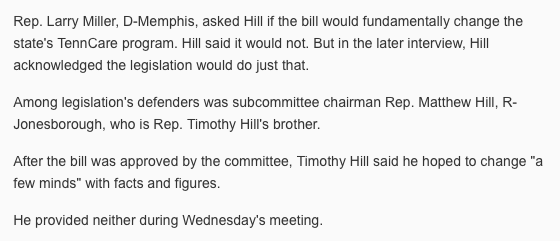Republican ‘block grant’ plan could cost Tenn. Medicaid program $1 billion by 2027
A Republican proposal under consideration could cause Tennessee’s Medicaid program known as TennCare to lose $1 billion in federal funding by 2027, according to an analysis of block grant legislation.
The analysis that predicted the $1 billion reduction was prepared by Avalere, a healthcare consulting group that calculated the costs associated with federal legislation aiming to convert the Medicaid program into a block grant system.
President Donald Trump promised block grant funding for Medicaid as a candidate. When Republican members of the U.S. Senate attempted to write legislation to make Trump’s promise a reality, the proposal failed because it could not even gain traction within their own party.
Under current federal Medicaid rules, anyone who qualifies for TennCare insurance (primarily low-income residents and the disabled) is covered for services defined by both federal and state officials. The block grant plan would give the Tennessee legislature more control over who gets health coverage and for what services.
A block grant would dole out money to Tennessee based on a formula, but so far the formulas have led to lower federal outlays over time. In recent years, the federal government has paid for about 60 percent or more of the cost with state tax coffers responsible for the rest. Any reduction in federal spending for the program could cause serious problems in Tennessee, where TennCare funding in the second largest expense (22% in FY2016-2017).
Both the American Hospital Association and the Federation of American Hospitals have warned about the consequences and legality of block grant funding, according to ModernHealthcare.com.
The proposal HB1280, sponsored by Rep. Timothy Hill, R-Blountville, District 3, directs the governor to seek approval for a block grant from the federal Centers for Medicare & Medicaid Services.
The measure passed the House TennCare Subcommittee on Feb. 27 by a 5-2 vote and will be voted on by the House Insurance Committee on March 6.

A reporter for The Tennessean who attended the Feb. 27 subcommittee meeting captured exactly how few details are known before Republican members decided regardlessly to send the bill the full House Insurance Committee.
More reading:
Voices4Kids: 10 Reasons to Reject Medicaid Block Grants
Sycamore Institute: What is TennCare?
How they voted:
House TennCare Subcommittee, Feb. 27, Voice Vote – Ayes Prevail:
Rep. Matthew Hill, R-Jonesborough, District 7
Rep. Ron Gant, R-Rossville, District 94
Rep. Bryan Terry, R-Murfreesboro, District 48
Rep. Ron Travis, R-Dayton, District 31
Rep. Jason Zachary, R-Knoxville, District 14
Voting No:
Rep. Larry Miller, D-Memphis, District 88
Rep. Dwayne Thompson, D-Cordova, District 96
Bill sponsors:
Rep. Timothy Hill, R-Blountville, District 3
Speaker Glen Casada, R-Franklin, District 63
Rep. Matthew Hill, R-Jonesborough, District 7
Rep. Ron Gant, R-Rossville, District 94
Rep. Clay Doggett, R-Pulaski, District 70
Rep. Jason Zachary, R-Knoxville, District 14
Rep. Dan Howell, R-Cleveland, District 22
Rep. Bruce Griffey, R-Paris, District 75
Rep. Paul Sherrell, R-Sparta, District 43
Rep. David Byrd, R-Waynesboro, District 71
Rep. Chris Todd, R-Jackson, District 73
Rep. Scott Cepicky, R-Culleoka, District 64
Rep. John Crawford, R-Kingsport, District 1
Rep. Rush Bricken, R-Tullahoma, District 47
Rep. Mike Carter, R-Ooltewah, District 29
Rep. Bryan Terry, R-Murfreesboro, District 48
Rep. Robin Smith, R-Hixson, District 26
Rep. Michael Curcio, R-Dickson, District 69
Rep. Dale Carr, R-Sevierville, District 12
Rep. Andrew Farmer, R-Sevierville, District 17
Rep. Jay Reedy, R-Erin, District 74
Rep. James “Micah” Van Huss, R-Gray, District 6
Rep. Clark Boyd, R-Lebanon, District 46
Rep. Bud Hulsey, R-Kingsport, District 2
Rep. Iris Rudder, R-Winchester, District 39
Rep. Debra Moody, R-Covington, District 81
Rep. Andy Holt, R-Dresden, District 76
Rep. John Ragan, R-Oak Ridge, District 33
Rep. Cameron Sexton, R-Crossville, District 25